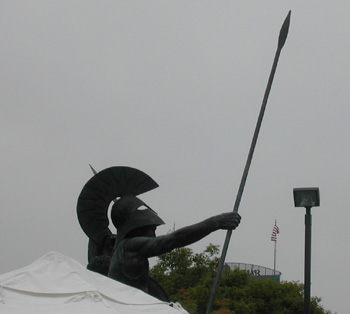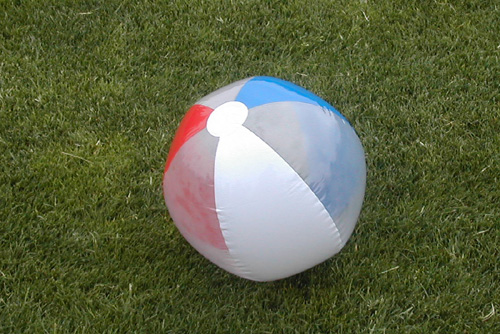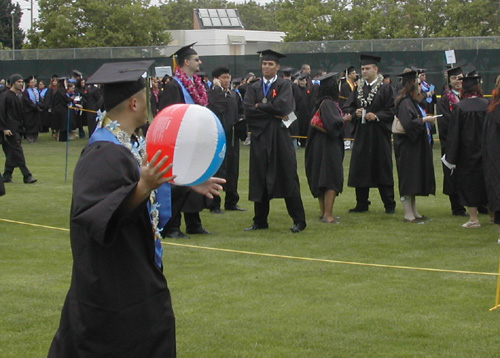I haven’t abandoned you, dear readers, I’ve just been attending to some tasks in the three-dimensional world. In the meantime, I want to recommend some great posts on other blogs. While some may leave you feeling reasonably good about doings in the world of science, I’m afraid others may break your heart. That doesn’t mean you shouldn’t read them.
Category Archives: Academia
Department of Homeland Security and academic labs.
In the June 4, 2007 issue of Chemical & Engineering News (which is behind a paywall accessible only to ACS members and those with institutional subscriptions, I’m afraid) there’s an article on how college and university labs may be impacted by the interim final regulation on chemical security issued recently by the Department of Homeland Security.
In a nutshell, that impact looks like it could involve thousands of hours and hundreds of thousands of dollars for a single university to comply with the rules, even if the chemicals they use fall into those specified by DHS as being at the lowest level of risk. As you can imagine, the colleges and universities are kind of freaked out.
Whistleblowing: the community’s response.
In my last post, I examined the efforts of Elizabeth Goodwin’s genetics graduate students at the University of Wisconsin-Madison to deal responsibly with their worries that their advisor was falsifying data. I also reported that, even though they did everything you’d want responsible whistleblowers to do, it exacted a serious price from them. As the Science article on the case [1] noted,
Although the university handled the case by the book, the graduate students caught in the middle have found that for all the talk about honesty’s place in science, little good has come to them. Three of the students, who had invested a combined 16 years in obtaining their Ph.D.s, have quit school. Two others are starting over, one moving to a lab at the University of Colorado, extending the amount of time it will take them to get their doctorates by years. The five graduate students who spoke with Science also described discouraging encounters with other faculty members, whom they say sided with Goodwin before all the facts became available.
In this post, I examine the community-level features that may have stacked the deck against the UW whistleblowers. Then, I suggest some ways to change the academic culture — especially they department culture — so that budding scientists don’t have to make a choice between standing up for scientific integrity and getting to have a career in science.
The price of calling out misconduct.
One of the big ideas behind this blog is that honest conduct and communication are essential to the project of building scientific knowledge. An upshot of this is that people seriously engaged in the project of building scientific knowledge ought to view those who engage in falsification, fabrication, plagiarism, and other departures from honest conduct and communication as enemies of the endeavor. In other words, to the extent that scientists are really committed to doing good science, they also have a duty to call out the bad behavior of other scientists.
Sometimes you can exert the necessary pressure (whether a firm talking-to, expression of concern, shunning, or what have you) locally in your individual interactions with other scientists whose behavior may be worrisome but hasn’t crossed the line to full-blown misconduct. In cases where personal interventions are not sufficient to dissuade (or to make things whole in the aftermath of) bad behavior, it may be necessary to bring in people or institutions with more power to address the problem.
You may have to blow the whistle.
Here, I want to examine the case of a group of graduate students at the University of Wisconsin-Madison who became whistleblowers. Their story, as told in an article in Science [1], illustrates not only the agony of trying to act responsibly on your duties as a scientist, but also the price you might have to pay for acting on those duties rather than looking out for your self-interest.
Commencement LOLdrums
I want to lay this at Julie’s feet, or maybe John Lynch’s, but I’m starting to think the LOLcats are taking over! My kids speak to each other in LOL dialect, and I’ve been mentally captioning … well, everything.
My internal dialogue from part of commencement transcribed below. If you know a good deprogrammer, please email me!
Commencement address bullet-points.

Having finished grading (yea, having submitted the final grades themselves), I attempt to resurface from my cave.
It’s really rather bright out here!
Anyway, as you will have deduced from my last post, there was a commencement-sized break in my grading activities on Saturday. The commencement speaker, Google senior vice president of global sales and business development Omid Kordestani, gave a nice address to the grads and their guests, so I’m reporting on his big points here.
A commencement story.

Ahem.
Beach ball here! Kids, I’m not going to march myself into the stadium!

That’s better. Thanks dude!
After this Saturday, it’s all gravy!
This post brought to you by my intense desire to avoid grading any more papers.
More than a dozen years ago, when I earned my Ph.D. in chemistry, I made what many at the time viewed as a financially reckless decision and purchased academic regalia rather than just renting it.
Where do you want scientists to learn ethics?
Because I am engaged in a struggle with mass quantities of grading, I’m reviving a post from the vault to tide you over. I have added some new details in square brackets, and as always, I welcome your insight here.
Lowered expectations.
I used to think what I really needed this time of semester was elves.
